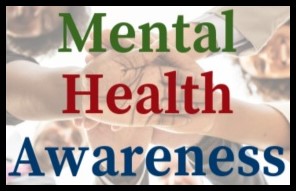 Bipolar disorder is a relatively recent term for what people used to call "manic depression." We are going to take a look at bipolar disorder in this installment of our Mental Health Awareness series.
Bipolar disorder is a relatively recent term for what people used to call "manic depression." We are going to take a look at bipolar disorder in this installment of our Mental Health Awareness series.
Those of us who have bipolar disorder experience intense, debilitating mood swings. We have low and high moods of varying intensity that can be brief or can last for several days (or months, or years). These highs and lows are more than just commonplace, everyday ups and downs. During the highs, or manic times, we can feel exhilarated, energetic, and we could be overly talkative. We may also be more likely to feel irritated or distracted, or behave recklessly. During the lows, or depressive episodes, we may feel despair or anxiety. We probably have little or no energy. Maybe we sleep too much, or hardly at all. Highs and lows may cycle back and forth over a short or long period.
Bipolar disorder is an episodic illness. We have intense feelings during one of our mood swings. And we are stable when we aren't experiencing a mood swing. But the term “bipolar disorder” doesn't describe a single, clearly delineated condition, but rather a group of related mood disorders. Psychiatrists have identified four different kinds of bipolar disorder, opens a new window:
| Bipolar I, opens a new window | We experience both manic and depressive episodes. The manic episodes can be extremely severe. |
| Bipolar II, opens a new window | We experience times of depression, and perhaps some manic times, but not as often or as severe as Bipolar I. Some of us with Bipolar II might not experience a fully manic episode in our lifetimes. |
| Cyclothymia, opens a new window | We experience milder lows and highs, off and on at separate times, for at least two years. Also called Cyclothymic Disorder. |
| Bipolar Disorder Not Otherwise Specified, opens a new window | We experience some, but not all, of the symptoms of the other three kinds of bipolar disorder. This makes it difficult for doctors to make a definitive diagnosis. Also called Bipolar NOS. |
The differences between the kinds of bipolar disorder are subtle and complicated. As a result, some of us have been initially misdiagnosed as having another disorder, such as depression, opens a new window, schizoaffective disorder, opens a new window, or ADHD, opens a new window.
Previous experience has taught us to keep journals of the way we feel so we can track the intensity and duration of our manic and/or depressive episodes. Some of us keep charts or use apps to track our mood changes. Sharing our journal, chart, or app contents with our doctors provides them with more detailed information about our condition, so we can work together to determine a proper course of treatment. It hasn't been quick or easy for us, but it has definitely been worth the time and effort. If you feel that you might be suffering from bipolar disorder, the writers at verywellmind.com, opens a new window have made an informative doctor discussion guide, opens a new window that could help you discuss your feelings and symptoms when you visit a doctor. Or, if you prefer, try this calendar/chart, opens a new window provided by the Depression and Bipolar Support Alliance, opens a new window. With help, bipolar disorder is treatable. We can have full, productive lives.
The International Society for Bipolar Disorders, opens a new window will observe World Bipolar Day on March 30, 2019: "The vision of World Bipolar Day, opens a new window is to bring world awareness to bipolar disorders and to eliminate social stigma."
If you or someone you know has symptoms of bipolar disorder and is in crisis, please contact one of these services as soon as possible:
- The National Suicide Prevention Lifeline, opens a new window at 1-800-273-8255, en español 1-888-628-9454, is available 24 hours a day, 7 days a week. The service is available to anyone and all calls are confidential. National Suicide Prevention's TTY number is 1-800-799-4889. National Suicide Prevention also has an online chat, opens a new window service.
- If you prefer texting, contact the Crisis Text Line, opens a new window by texting TALK to 741741. After sending this text message, you will receive an automated text asking about your crisis. Your response will help the team pair you with a counselor, and the Crisis Text Line will connect you to that counselor in minutes.
- The National Alliance on Mental Illness Helpline, opens a new window, 1-800-950-6264, is available Monday - Friday, 9 am - 5 pm CST.
Please note: This discussion of bipolar disorder is for informational purposes and is not meant to take the place of consultation with a physician or therapist.
If you're interested in reading previous posts in this Mental Health Awareness, opens a new window series, please look at the column to the left of this panel and click on any of the links there.
We have compiled a list of St. Tammany Parish Library resources and external websites that have more information about bipolar disorders. If you need help getting any title on this list, please contact your nearest St. Tammany Parish Library reference librarian, opens a new window.



Add a comment to: Mental Health Awareness: Bipolar Disorder